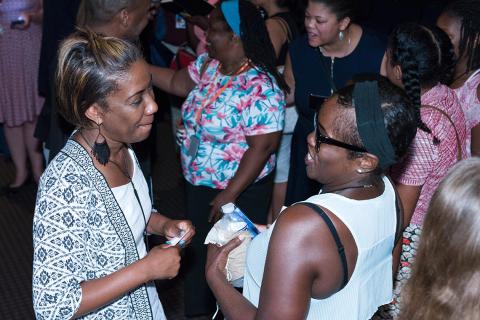NIH, Family of Henrietta Lacks Work to Advance Science, Protect Privacy

Photo: Andrew Propp
Henrietta Lacks is survived not only by descendants, but also by another legacy: millions of lives saved by research using cancer cells taken from her body without her knowledge.
Two of Lacks’ grandchildren, Jeri Lacks-Whye and David Lacks Jr., joined NIH director Dr. Francis Collins on the Masur Auditorium stage for a conversation recently about the unique collaboration between the Lacks family and NIH.
In February 1951, Lacks, an African-American woman, was diagnosed with an aggressive form of cervical cancer at Johns Hopkins Hospital. Doctors took cells from a biopsy of her tumor and—without her knowledge or consent—cultured them. She passed away later that year at age 31.
Hers were the first human cells to live and grow outside the body in culture. That cell line was denoted “HeLa”—“He” for Henrietta and “La” for Lacks. Her cells have contributed to some of the most important medical advances of the past half-century, including development of the polio vaccine.
Most people weren’t aware of the origin of HeLa cells until 2010, when author Rebecca Skloot published The Immortal Life of Henrietta Lacks, a bestselling book. Family members became identifiable. The story was later adapted into a television film starring Oprah Winfrey.
“HeLa cells were derived decades before there were federal regulations to require consent for participation in research,” Collins said.
In 2013, a German research team published the first HeLa whole genomic sequence and uploaded the findings to a public database. When they found out, the Lacks family raised concerns about whether this might reveal aspects of their own potential medical risks and asked the group to take the information down.

Photo: Andrew Propp
Collins and Dr. Kathy Hudson, former NIH deputy director for science, outreach and policy, made three trips to Baltimore to meet with the Lacks family and hear about their experiences, address their concerns and “see if there was a way forward.” Skloot and two Johns Hopkins University professors also participated in the meetings.
NIH reached an agreement with the Lacks family about data sharing later that year. Lacks-Whye said it was a “great honor” that Collins visited Baltimore to “listen to our concerns and questions.”
Dr. Dina Paltoo, director of the Office of Science Policy’s Division of Scientific Data Sharing, said investigators who want to sequence HeLa cells must ask the HeLa genome data access working group for permission. The group includes two members of the Lacks family. It reports its findings to the advisory committee to the NIH director, which makes recommendations to the director.
The group requires investigators to use the genome only for health, medical or biomedical research objectives; to not initiate contact with the family; to reveal their commercial plans; to acknowledge the family’s contributions to science; and to deposit their findings in a controlled-access data repository.
“So far, the working group has evaluated 67 requests, 59 of which have been approved by the NIH director,” Paltoo said.

Photo: Andrew Propp
For David Lacks Jr., sitting on the working group is a “rewarding and gratifying” experience. At first, he relied on the committee to answer his questions about genomics. He began studying the field and “dove into the books.” Soon enough, he picked up the terminology and, now, when he reads proposals, he thinks, “Wow, they want to do this? I can’t wait to see the outcome.”
Before the agreement, both grandchildren said the family always learned about developments regarding HeLa cells after the fact. Now they have representation on the working group and are the first to know what’s happening to the cell line.

Photo: Andrew Propp
“That makes a big difference. It’s a matter of improving communications,” Lacks Jr. said. “You don’t want to deny science, you just want to know what’s happening. Some folks may not think it’s important. But for us it is. We want to be involved and engaged.”
Collins said the family’s experience is a reminder that scientists have an obligation to respect people who are involved in research.
When asked what they thought of the film adaptation of Skloot’s book that was recently shown on HBO, both grandchildren thought the movie could have been a mini-series instead of a single show. Overall, though, they enjoyed it.
“It got Henrietta Lacks’ name out there,” Lacks-Whye said.
Getting to know the Lacks family has been a remarkable experience for Collins and his colleagues. He credited the Lacks’ experience over the past 4 years as a reason for the elevated consciousness of issues about balancing respect for people in research and the benefits of open data access.
“I think it’s fair to say the Lacks family probably ranks at the top of the list in all of history as medical philanthropists,” Collins concluded.
A video of the conversation can be found at https://videocast.nih.gov/summary.asp?Live=24809&bhcp=1.
